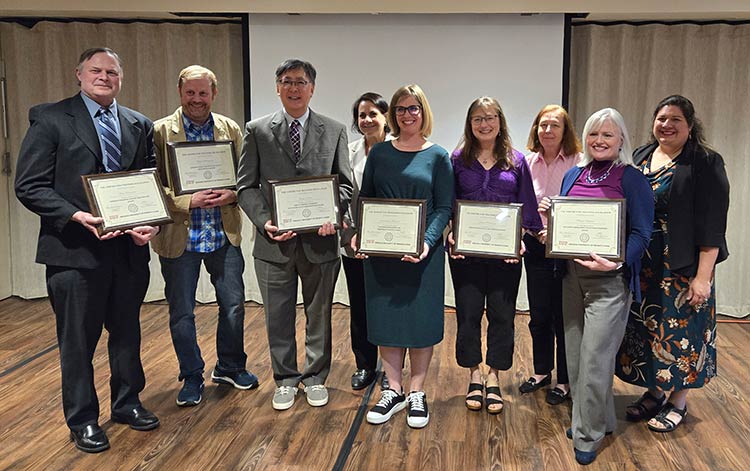 Yong Colen
Yong Colen
Department of Mathematical and Computer Sciences
OER/Affordable Learning Solutions
Title: Efficacy in Using Khan Academy’s Open Educational Resources to Teach a Statistics and Probability Course
Abstract: In the fall of 2023, utilizing the Khan Academy’s (KA) Open Educational Resources (OER), I taught two mathematics courses: MATH 105 (College Algebra) and MATH 217 (Statistics and Probability). Pedagogically, I also implemented a “flipped-classroom model.” In short, using KA, students examined the assigned videos and completed the relevant exercises before coming to class. In-class lessons focused in answering student questions, solving additional exercises, and clarifying more challenging concepts. Overall, students performed significantly better using the KA material. Specifically, 82.7% of students earned a final grade of at least a C using KA compared to 73.9% of students using a traditional textbook. Furthermore, students were much more engaged in their learning due to an emphasis on their understanding, incorporation of practical apps, and accessibility support (e.g., video transcriptions).
 Jana Villemain
Jana Villemain
Madia Department of Chemistry, Biochemistry, Physics, and Engineering
Innovation
Title: Developing Interactive Activities with Public databases and 3D models to Provide Authentic Experiences for Learning Basic Biochemical Principles and Understanding Biomolecule 3D Structures
Abstract: Successfully learning biochemistry combines mastering facts about the physical and chemical properties of complex biomolecules with developing problem solving and critical thinking skills to fully understand how they function in the cellular environment. The goal for my course is to lay the groundwork in biochemistry and equip students with strategies to build on their knowledge and apply it to solve problems throughout their careers and life. To teach essential biochemistry content in a manner that supports this goal, I have implemented case based and interactive activity assignments associated with many topics in my class. These activities lead students through investigations of molecule structures and introduce concepts using exploration of publicly available databases, bioinformatics tools and molecular visualization software commonly used by professions in the field of biochemistry. Many students express difficulty in translating 2D molecular visualization to 3D molecules; therefore, I pair discussion of molecule structures with examination of 3D printed models of proteins and other biomolecules generated by the NIH 3D print exchange and printed on a 3D printer obtained previously with IUP ACPAC funds. Research shows that students learn more at a surface level with traditional lecture-based methods. Thus, I have taken steps to progress from primarily lecture-based delivery of course content in biochemistry to an integrated case-based learning pedagogy that encourages greater student engagement and development of skills for life-long learning. Student feedback through comments class and class performance demonstrates deeper learning of key concepts and enhanced skills at finding, manipulating, and analyzing biochemical information typically used in research and professional settings.
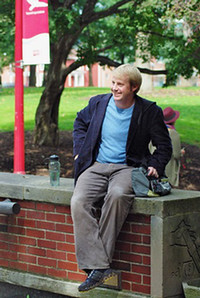 Todd Thompson
Todd Thompson
Department of English
Instructional Technology
Title: Instructional Technology Award Application
Abstract: I hope that my application and supplementary materials (including course syllabus and access to D2L site) effectively demonstrate that my asynchronous, online ENGL 121 Humanities Literature course is built, organized, and delivered on strong instructional design principles that prioritize consistent, and consistently innovative, student engagement.
The current version of this course on D2L was constructed with the following design principles foremost in mind: active engagement with students and their work, consistency of deadlines and approach, clarity of organization, and multiple avenues to content to aid students’ educational journeys. Additionally, weekly responses, quizzes, learning activities, and learning logs, as well as my "closing the loop" feedback to student work, foreground consistent communication and engagement.
Finally, major course projects--including an exam that students help to write, a short paper in which students compare a poem to a favorite song, and a mini-anthology in which students construct their own canons and announce their literary aesthetics--all feature a student-centered approach that encourages students to connect literary study to their own lives and interests.
In addition to the course syllabus and fall 2022 course evaluations, D2L course access to "Fall 2023 Humanities Literature META -ENGL 121-803-804" has been provided for Drs. Rachel DeSoto Jackson and Kalani Palmer.
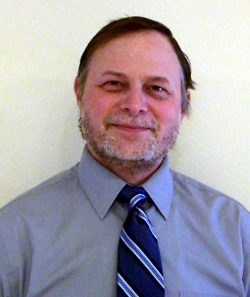 Tim Hibsman
Tim Hibsman
Department of English
Content Pedagogy
Title: Practical Pretending
Abstract: Escape the classroom and walk into a simulated, real-life, practical, hands-on learning scenario. One of the best ways to teach students is to transform the classroom into a real-life environment. The teacher may have to change roles and become an employer or customer to help the student visualize a practical scenario where they can implement their newly acquired classroom skills. Creating a law firm is the key focus of the English 227, Introduction to Legal Writing course. Students have to determine what kind of law they are interested in and create their own business which they develop throughout the semester. As the professor of the class, I send them customers that they must assist in a professional manner. Each week their clients will have specific legal issues. Students must research the situation and provide the customers with the necessary documents. These cases are all real-life examples. Students must understand the course materials and then interact with the clients (sometimes even dressing the part) to complete the practical scenario. Students learn about legal writing while preparing necessary skills for their future courses, internships, and future careers.
 Stephanie Keppich
Stephanie Keppich
Department of Communications Media
Teaching Excellence for Temporary Faculty
Title: Recognizing Exceptional Contributions to Student Experience and Outcomes in Media Production
Abstract: The strength of temporary faculty member Stephanie Keppich's broadcast television industry experience has translated into unmatched outcomes for Indiana University of Pennsylvania media production students across the Pennsylvania State System of Higher Education. Students from only one other PASSHE university have been recognized for their high level of television production quality for producing a live sporting event. Students enrolled in Keppich's Digital Sports Production course in fall 2022 produced and streamed live, a full football broadcast, complete with a pre-show on November 12, 2022. The broadcast, which happened to be the PSAC Championship game between IUP and Shepherd University, was later submitted to the Mid-Atlantic Chapter of the National Academy of Television Arts and Sciences, College Student Production Awards. Sixteen students, led by Keppich, worked in tandem to conceive, create, write, design, and script the show and then transport equipment, set up and build the entire production area at Miller Stadium, where they livestreamed the game. In October 2023, the students were recognized at the 2023 Mid-Atlantic Emmy Awards ceremony in Lancaster and received the Crystal Pillar for the best College Student Production in Live Sports competing against universities from Pennsylvania, New Jersey, and Delaware. Keppich's course syllabus puts a premium on soft skills which employers are seeking. Students are assessed on their professionalism throughout the class - from meeting a dress code to being prompt for productions and showing grace in a high-pressure environment. Students are required to sign a waiver before the semester agreeing to not miss a game production and attesting if they do, they will be given a failing grade. Keppich's commitment to students extends beyond the classroom as you can see her serving late-night pancakes and accompanying her students to professional opportunities in Pittsburgh and Las Vegas.
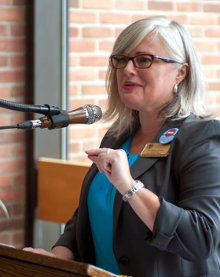 Tanya Heflin
Tanya Heflin
Department of English
Inclusive Excellence
Title: Literature, Film, and Cultural Production from the Native Nations of North America
Abstract: In the spring 2022 semester, it was my great pleasure to deliver a new iteration of the IUP Department of English’s course ENGL 344: Ethnic American Literature. I was particularly enthused to design a new course that would introduce undergraduate readers to a world of indigenous literature that I was fairly sure they had not yet encountered in depth. With this possibility in mind, I designed the course to begin with a unit on film, particularly six contemporary film and TV pieces produced by indigenous communities to immediately shatter notions of indigeneity as residing solely in a stereotypical and fantasized American West of the distant past. This focus on historical and regional specificity is a hallmark of my design for the course, as demonstrated throughout my syllabus and in the photographs of my students’ region-specific team projects that are placed throughout this document. The second four-week unit, “Contemporary Fiction in Context,” focused primarily on Ojibwe writer Louise Erdrich’s influential and National Book Critics Circle Award-winning story-cycle and novel Love Medicine, a classic work of American fiction that many students had heard of but not yet read. This unit was supplemented by critical theory from David Treuer (Ojibwe), Susan Egenolf, Enrique Lama, and Sarah Parker and Wilson Kaiser, along with specific lessons to teach these third- and fourth-year students useful strategies for reading literary critical material. The third and final unit of the course, “Exploring Native Nations by Place: Oral Tradition and Poetry,” asked students to select the region in which they wished to “specialize” for the remainder of the course. Using Muskogee poet Joy Harjo’s exceptionally well-conceived anthology When the Light of the World Was Subdued, Our Songs Came Through: A Norton Anthology of Native Nations Poetry, which had been published in 2020 during her tenure as US poet laureate, the remainder of the semester was devoted to studying poetry and oral tradition spanning the 1600s through the present region by region. The team project was multifaceted and consisted of devising, as I stated on the assignment sheet, “a pedagogical or public humanities project to convey the richness of the region to classmates and a broader audience.” While I thoroughly enjoyed the first two units on film and fiction, I was astounded by the energy and excellence that students brought to this third unit’s region-specific group-based projects. More than any individual essay or discussion post, this event of shared discovery and knowledge demonstrated how far these students had come in their understanding of this extraordinarily rich and understudied body of American literature and culture.
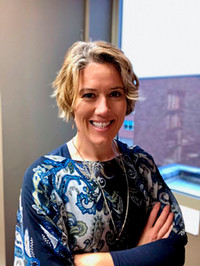 Erin Conlin
Erin Conlin
Department of History
Inclusive Excellence
Title: Inclusive Excellence Award Application
Abstract: Erin Conlin’s application highlights her commitment to inclusive teaching both in course content and the classroom learning community. As a teacher who focuses primarily on twentieth-century US history, she selects course materials that reflect a diversity of perspectives. That is important not only so that we craft more accurate and nuanced analyses of US history, but also so that students see themselves reflected in those narratives. She wants students who identify with historically marginalized groups to see their story as an integral part of the past, and she wants students from the majority populations to recognize the validity and contributions of all people in our national history. When people see themselves represented in history, they are more comfortable talking about the experiences of “people like them” and they can offer diverse perspectives and unique insights. Conlin’s commitment to creating a diverse, equitable, and inclusive community extends well beyond the classroom. She has participated in several CTE workshops focused on inclusive teaching, has partnered with important programs on campus, like the Promising Scholars Program, and served on the President’s DEI Commission. In that capacity, she helped author a university-wide DEI classroom policy and create supplemental materials outlining how and why IUP should value DEI work in the tenure and promotion process.
Congratulations to all of the winners!
